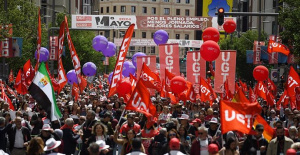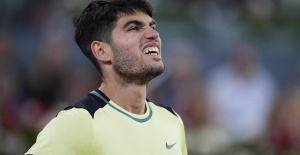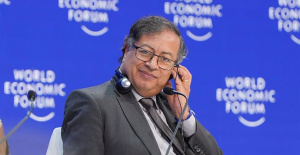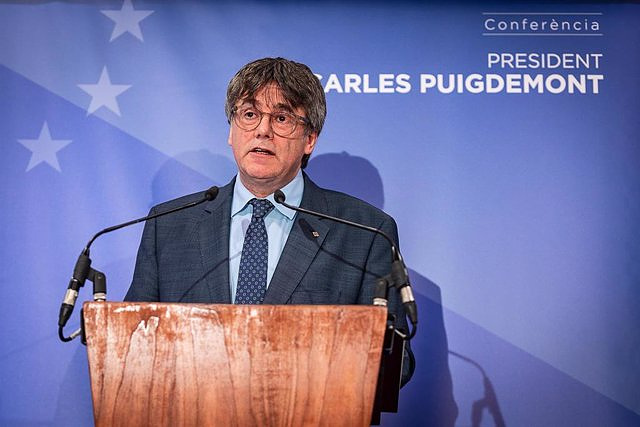He insists that it will not be up to him to decide on the constitutionality of the norm
MADRID, 6 Oct. (EUROPA PRESS) -
The investigating judge of the 'procés' case, magistrate Pablo Llarena, has refused to withdraw from the case for having ruled on the "constitutionality" of a possible amnesty law, as requested by former Catalan president Carles Puigdemont. It is the fifth time that the independence leader has tried to expel the judge from the procedure.
Puigdemont asked the Supreme Court (TS) to remove Llarena - in charge of investigating him for an alleged crime of disobedience and embezzlement - for speaking out, in an event held on September 11, on the "constitutionality" of a possible amnesty to the 'procés'.
In the writing, to which Europa Press has had access, the defense of the independence leader insisted on an argument that he had already used on previous occasions against the magistrate: "His absolute lack of impartiality."
Now, Llarena has issued an order - reported by Europa Press - in which he calls Puigdemont's request "manifestly unfounded." As he explained, the conference in which he participated took place in a "strictly academic" space and responded to the analysis of the basic technical criteria for supervising the constitutionality of any legal norm, but without evaluating any specific aspect of a possible amnesty law.
In this sense, the judge has insisted that in said conference he did not advance his procedural position at any time, but rather made a general and open academic approach that was highlighted by the media.
In any case, Llarena has assured that - regardless of the content of the conference - its impartiality cannot be considered compromised when the recusants demand their immediate separation from the investigation.
The magistrate has stressed that "it is impossible" that his conference could reflect any conditions for the processing of the case today, since no amnesty law has been promulgated that can be applied today to the case being prosecuted.
"The current cause of recusal seeks the immediate removal of the instructor by speculating on my position in the face of a legal provision that does not exist and may never exist, so that consideration today lacks any relevance for the case," he noted.
Subsequently, the judge explained that "in the event that one day an amnesty law were to be enacted, with material application criteria that do not even exist today, it will not be up to the instructor to decide on the constitutionality of the norm, not even "it will not be up to you to question its constitutional validity or to raise a question of unconstitutionality."
Consequently, Llarena has concluded that the challenge is based on a "manifestly unfounded" cause of abstention, which justifies its inadmissibility 'a limine' (outright) and has stressed that he sees in this maneuver a delaying strategy of the defense.
The magistrate has assured that Puigdemont's actions could have been "instrumentalized" to -- while it is resolved -- delay any action by this instructor aimed at issuing a possible European arrest warrant, procedurally foreseeable, and to be able to complete a case that is only pending. that an investigative statement is received from the rebellious defendants.
For the judge, the dilatory purpose is underlined by the recusal documents themselves, which state that the recusal process can be extended to the magistrates called to resolve it, thus generating a chain of exclusions that delays the final decision on the instructor's possibilities of action. and, with it, the possibility of making any decision in the process.
This being the case, it has influenced that this obstructive intention is perceived with greater probability from the consideration, already advanced, that on numerous occasions the defendants have "unjustifiably" challenged him.
On this point, Llarena has recalled that if Puigdemont and the rest of the defendants in absentia - with this or other procedural strategies - manage to reach the date of June 2024 without making it possible to effectively claim the jurisdictional cooperation of other countries, the request requested from the current European Parliament of which they are part.
For all these reasons, the judge flatly rejects this fifth challenge, based on reiterated doctrine of the Constitutional Court.

 Exploring Cardano: Inner Workings and Advantages of this Cryptocurrency
Exploring Cardano: Inner Workings and Advantages of this Cryptocurrency Seville.- Economy.- Innova.- STSA inaugurates its new painting and sealing hangar in San Pablo, for 18 million
Seville.- Economy.- Innova.- STSA inaugurates its new painting and sealing hangar in San Pablo, for 18 million Innova.- More than 300 volunteers join the Andalucía Compromiso Digital network in one month to facilitate access to ICT
Innova.- More than 300 volunteers join the Andalucía Compromiso Digital network in one month to facilitate access to ICT Innova.-AMP.- Ayesa acquires 51% of Sadiel, which will create new technological engineering products and expand markets
Innova.-AMP.- Ayesa acquires 51% of Sadiel, which will create new technological engineering products and expand markets COMUNICADO: Energy Transitions Commission (ETC) Urges Government and Industry Collaboration to Overcome Perceptions of Offshore Wind
COMUNICADO: Energy Transitions Commission (ETC) Urges Government and Industry Collaboration to Overcome Perceptions of Offshore Wind UGT and CCOO demand the regeneration of democracy, better salaries and a reduction in working hours
UGT and CCOO demand the regeneration of democracy, better salaries and a reduction in working hours Alcaraz gives up his reign in Madrid against Rublev
Alcaraz gives up his reign in Madrid against Rublev Petro announces that Colombia will break diplomatic relations with Israel
Petro announces that Colombia will break diplomatic relations with Israel How Blockchain in being used to shape the future
How Blockchain in being used to shape the future Not just BTC and ETH: Here Are Some More Interesting Coins Worth Focusing on
Not just BTC and ETH: Here Are Some More Interesting Coins Worth Focusing on Ivace and promotes a less invasive device for the early detection of prostate cancer
Ivace and promotes a less invasive device for the early detection of prostate cancer Valencia unanimously approves the ordinance to allocate spaces to test innovative initiatives
Valencia unanimously approves the ordinance to allocate spaces to test innovative initiatives UPV researchers promote a paid master's degree as a "talent factory" in integrated photonics
UPV researchers promote a paid master's degree as a "talent factory" in integrated photonics A spin-off of the UV works on obtaining high-resolution 3D biomedical images in real time
A spin-off of the UV works on obtaining high-resolution 3D biomedical images in real time A million people demonstrate in France against Macron's pension reform
A million people demonstrate in France against Macron's pension reform Russia launches several missiles against "critical infrastructure" in the city of Zaporizhia
Russia launches several missiles against "critical infrastructure" in the city of Zaporizhia A "procession" remembers the dead of the Calabria shipwreck as bodies continue to wash up on the shore
A "procession" remembers the dead of the Calabria shipwreck as bodies continue to wash up on the shore Prison sentences handed down for three prominent Hong Kong pro-democracy activists
Prison sentences handed down for three prominent Hong Kong pro-democracy activists ETH continues to leave trading platforms, Ethereum balance on exchanges lowest in 3 years
ETH continues to leave trading platforms, Ethereum balance on exchanges lowest in 3 years Investors invest $450 million in Consensys, Ethereum incubator now valued at $7 billion
Investors invest $450 million in Consensys, Ethereum incubator now valued at $7 billion Alchemy Integrates Ethereum L2 Product Starknet to Enhance Web3 Scalability at a Price 100x Lower Than L1 Fees
Alchemy Integrates Ethereum L2 Product Starknet to Enhance Web3 Scalability at a Price 100x Lower Than L1 Fees Mining Report: Bitcoin's Electricity Consumption Declines by 25% in Q1 2022
Mining Report: Bitcoin's Electricity Consumption Declines by 25% in Q1 2022 Oil-to-Bitcoin Mining Firm Crusoe Energy Systems Raised $505 Million
Oil-to-Bitcoin Mining Firm Crusoe Energy Systems Raised $505 Million Microbt reveals the latest Bitcoin mining rigs -- Machines produce up to 126 TH/s with custom 5nm chip design
Microbt reveals the latest Bitcoin mining rigs -- Machines produce up to 126 TH/s with custom 5nm chip design Bitcoin's Mining Difficulty Hits a Lifetime High, With More Than 90% of BTC Supply Issued
Bitcoin's Mining Difficulty Hits a Lifetime High, With More Than 90% of BTC Supply Issued The Biggest Movers are Near, EOS, and RUNE during Friday's Selloff
The Biggest Movers are Near, EOS, and RUNE during Friday's Selloff Global Markets Spooked by a Hawkish Fed and Covid, Stocks and Crypto Gain After Musk Buys Twitter
Global Markets Spooked by a Hawkish Fed and Covid, Stocks and Crypto Gain After Musk Buys Twitter Bitso to offset carbon emissions from the Trading Platform's ERC20, ETH, and BTC Transactions
Bitso to offset carbon emissions from the Trading Platform's ERC20, ETH, and BTC Transactions Draftkings Announces 2022 College Hoops NFT Selection for March Madness
Draftkings Announces 2022 College Hoops NFT Selection for March Madness























